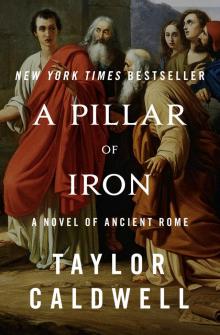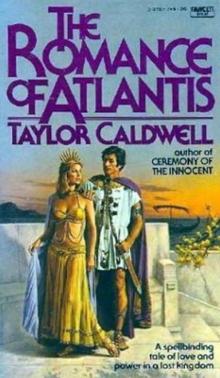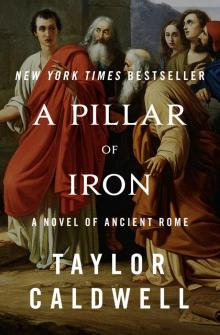- Home
- Taylor Caldwell
The Romance of Atlantis
The Romance of Atlantis Read online
THE ROMANCE
OF ATLANTIS
Taylor Caldwell
with
Jess Stearn
First published by
William Morrow & Company, Inc.
1975
An extraordinary manifestation of psychic phenomena, a literary discovery!—the first novel by one of America’s most popular novelists, written sixty years ago when she was twelve, permitted to lie fallow for over half a century, and now prepared for publication by a prize-winning reporter, a best-selling author himself and specialist in the occult…
THE ROMANCE OF ATLANTIS
by Taylor Caldwell
Author of Captains and the Kings,
Glory and the Lightning, etc.
with Jess Stearn
Author of The Search tor a Soul,
A Prophet in His Own Country, etc.
Taylor Caldwell’s own grandfather, a book editor in Philadelphia, suppressed The Romance of Atlantis, for he could not believe that this extraordinary creation was the work of a young girl, could only conclude that it had been plagiarized. Reading the novel today, assured of its authenticity, one nonetheless understands and shares his sense of wonder.
In its grasp of technology, for example, it is clearly prophetic for its time, while the detail of scene and action is so ample and varied as to suggest an eyewitness account. And whether or not one finally decides that this is the result of extrasensory perception or—as many will—singular evidence of reincarnation, one is certain to be beguiled.
The Atlantis which Taylor Caldwell pictures for us with such immediacy is a highly sophisticated society. Its technology is so advanced that it has harnessed both nuclear and solar energy. Its birth-control techniques are perfect, though practiced only by the upper classes. It understands the processes of rejuvenation. For all of this, not unlike many other sophisticated cultures, past and present, Atlantis is in moral decay, dissolute, and like an overripe peach ready to fall to the ground.
It is a caste society. Faction fights faction, and decadence is rile. Moreover, as the novel opens, Atlantis is subject to strange omens and portents. A never-lifting mist hangs over the country, and the flow of both nuclear and solar power has been mysteriously interrupted. In the streets of Lamora, the capital city, newly arrived foreigners are proclaiming the one and only true god and prophesying the imminent doom of Atlantis. In the north of the continent of which Atlantis occupies the temperate southern zones, Signar, king of the Althustrians, is jealous—jealous for possession of Atlantis and of its splendid, even glamorous queen, Salustra.
It is Salustra, in fact, who provides the focus, and the reader is caught in the ebb and flow of her personal fortunes, as well as those of her beloved Atlantis, right up to the cosmic climax.
Fascinating in content, dramatic and apt to our times, mysterious in its origins, The Romance of Atlantis is a true wonder.
Jess Stearn and Taylor Caldwell earlier collaborated on Mr. Steam’s The Search for a Soul: Taylor Caldwell’s Psychic Lives.
From Taylor Caldwell’s Postscript to
THE ROMANCE OF ATLANTIS
“I knew, months ago, that Jess was going to do something about my childhood novel on Atlantis, but I forgot it completely in the stress of my existence. So I have no explanation of suddenly ‘experiencing’ my life on Atlantis after all these years, when I dreamed that I was the Empress Salustra in this book. This dream happened a few weeks ago, and then in the weeks following, I had two other ‘experiences’ as the Empress Salustra of Atlantis…
“I cannot imagine from where these strange dreams emerged, or what their significance is—if there is any significance at all. The only thing I know with certainty is that the dreams were more vivid than my present reality, more poignant, more agonizing and more joyful. They haunt me, coloring my whole existence, and I feel deprived and filled with an ancient longing.”
Books by Taylor Caldwell
DYNASTY OF DEATH
THE EAGLES GATHER
THE EARTH IS THE LORD’S
THE STRONG CITY
THE ARM AND THE DARKNESS
THE TURNBULLS
THE FINAL HOUR
THE WIDE HOUSE
THIS SIDE OF INNOCENCE
THERE WAS A TIME
MELISSA
LET LOVE COME LAST
THE BALANCE WHEEL
THE DEVIL’S ADVOCATE
NEVER VICTORIOUS, NEVER DEFEATED
TENDER VICTORY
THE SOUND OF THUNDER
DEAR AND GLORIOUS PHYSICIAN
THE LISTENER
A PROLOGUE TO LOVE
GRANDMOTHER AND THE PRIESTS
THE LATE CLARA BEAME
A PILLAR OF IRON
NO ONE HEARS BUT HIM
DIALOGUES WITH THE DEVIL
TESTIMONY OF TWO MEN
GREAT LION OF GOD
ON GROWING UP TOUGH
CAPTAINS AND THE KINGS
TO LOOK AND PASS
Books by Jess Stearn
Fiction
THE REPORTER
Nonfiction
A PROPHET IN HIS OWN COUNTRY:
The Story of the Young Edgar Cayce
THE SEARCH FOR A SOUL: Taylor Caldwell’s Psychic Lives
THE MIRACLE WORKERS: America’s Psychic Consultants
A TIME FOR ASTROLOGY
ADVENTURES INTO THE PSYCHIC
THE SEEKERS
THE SEARCH FOR THE GIRL WITH THE BLUE EYES
EDGAR CAYCE—THE SLEEPING PROPHET
YOGA, YOUTH AND REINCARNATION
THE GRAPEVINE
THE DOOR TO THE FUTURE
THE SIXTH MAN
THE WASTED YEARS
SISTERS OF THE NIGHT
In Collaboration
THE ROMANCE OF ATLANTIS
For the feathered Caesar, whose own forebears were quite prominent in Taylor Caldwell’s Atlantis.
“But now they desire a better country, that is, an heavenly: wherefore God is not ashamed to be called their God: for he hath prepared for them a city.”
—HEBREWS 11:16
Foreword
At the age of twelve, Janet Taylor Caldwell wrote a romance of Atlantis, a presumably legendary land that she knew nothing about. Her father, a newspaper artist, was amazed by the perception in the manuscript, its detail and insight. He sent it to the child’s grandfather, a book editor, in Philadelphia. The latter, promptly horrified, suggested the manuscript be destroyed immediately. He did not feel that any child could have produced so unusually mature a work, intellectually and philosophically. The only alternative that suggested itself was that she had borrowed freely elsewhere. In a way, he was right. She had borrowed from the past, not knowing herself how she was dredging up that past.
The manuscript lay fallow for sixty years. Then, on the strength of my collaboration with the novelist in The Search for a Soul, The Psychic Lives of Taylor Caldwell, I was given the task of readying the manuscript for publication. Provocative situations that Miss Caldwell had touched upon were amplified, some of the child’s prose simplified; but the situations, descriptions, characters and story line remain pretty much as they inexplicably came from the pen of a twelve-year-old child. The insight, the wisdom, the biting wit, the disenchantment and yet the eternal optimism that intrigued and affected me are still there, together with an allegorical narrative that seems to fit our world with dramatic aptness. Indeed, it almost seems at times that the famous novelist as a child wrote this, her first novel, with prophetic insight. Judge for yourself.
J.S.
1
The Emperor was two hundred years old, and even with the rejuvenation chamber few lived more than two hundred years in Atlantis. His fierce eyes were dimmed, li
nes of pain threaded the tired face. His forehead was beaded with sweat, which a dusky eunuch wiped at intervals with a silk cloth banded in gold. Around the Emperor’s throat was a chain of gold, fastened in front with a crystalline seven-colored gem, which gave renewed energy to the weary. His hands, once powerful, were folded in resignation on his breast. A solemn-looking physician stood behind the Emperor’s great bed, registering just the right note of concern. The Emperor had already sent for his two daughters. Salustra, the elder, was in the glorious dawn of ripening womanhood; Tyrhia was yet a child with a boy’s figure. The father’s fevered eyes turned to them with passionate intensity. Salustra! Was there anything more magnificent than this girl? She was not unlike her mother, thank the eternal gods! For her mother, the incomparable Maxima, had been an aristocrat to her impenetrable core. Salustra was tall for a woman, and her figure was such as to give the imagination pause. She had the Emperor’s eyes, flashing with vitality. Her skin was pale and clear, with a birthmark high on the cheekbone which turned scarlet when she was aroused. Her mouth, though proud, was warm and inviting. Her tawny hair, reaching to her knees, glistened with a luster that seemed to catch the highlights of the sun. The white column of her throat, rising proudly from her marble shoulders, was strong and supple, giving her the carriage of a queen.
The dying Emperor sensed instinctively the feminine glory Salustra would soon know. He noted the sinuous curve of her thigh and calf and, with satisfaction, the strength in the line of her jaw and the blue steel of her eyes. Perhaps she walked too confidently, too arrogantly for a woman, but the muscles under the shimmering skin were as sinewy as those of a man. Lazar smiled as he saw in Salustra his own indomitable will. As he looked at Tyrhia, the smile faded. Though actually but a few years younger than Salustra, she was still unformed, with a vapid, unclouded countenance. A circlet of gold dangling from her arm matched the yellow curls that framed her pretty face. Her hands were fluttering and white and somewhat helpless.
She was like her mother, the base-born Lahia. Seeing the child, the Emperor remembered the mother. She had been a slave of surpassing beauty, a tribute from the petty kingdom of Mantius, to which he had granted independence, taking only the beautiful Lahia as a victor’s spoils. Lahia had been weak, often vicious, constantly conniving. Nevertheless, Lazar, succumbing to the tyranny of the weak over the strong, loved her until his betrayal. Not until she carried his child did he discover that the Empress had plotted with an envoy from powerful Althrustri to poison his wine. Tyrhia was about due, and Lazar, who yearned for a son, had refrained from one word of rebuke. However, the Empress had guessed from his averted eyes that he knew, and she had literally died of fear after the child was born. Lazar had had her entombed with ceremony, and the world, aside from the Althrustri regime, was none the wiser. He had not thought about any of this for years. Now he held out a wavering hand to his children. Tyrhia, with the easy tears of the emotionally unstable, kneeled beside him, curling herself in the hollow of his wasted arm. Salustra stood looking at her father gravely, and waited. She was very white, and though her pale lips were set, they trembled slightly at the corners.
She bent closer to her father. At the touch of her fingers, it was as though under the smooth skin he had felt the sinew of steel. His eye notably brightened, and any misgivings he had vanished.
“My children,” he said wistfully, “I am dying. But it is a natural and peaceful thing; where I go, you too will go one day. I am merely taking the path before you. I am accepting death as naturally as I have accepted life. It is but a phase of the human drama.”
Tyrhia’s sobs rent the air, causing the doctor to look at her reprovingly. Unheeding of her sister, Salustra gazed at her father, her dark eyes still and watchful.
“Salustra, my daughter.” He motioned to her. She took the cloth from the eunuch and wiped the perspiration from the dying man’s forehead. He drew a deep breath and closed his eyes as though willing his departing soul to halt its flight for a grudging moment.
“Salustra,” he said, his voice hoarse with the effort of speaking, “in thy hands I leave my empire. Dost thou understand, girl?” He looked up into her face, and something he saw there gave him joy. “My time is near, Salustra,” he said, “but what I have to say must be said. My empire is thine. Think of it! From east to west it extends three thousand miles sea to sea! From north to south, four thousand miles from icy glaciers to the tropic sands! A glorious heritage for him who merits it.”
Salustra said nothing, but her eyes had begun to glitter.
The sun, gleaming through the pillars, cast a golden glow over her features. A pulse leaped in the hollow of her throat. She fingered the chain on her father’s neck and he nodded feebly for her to take it.
The Emperor groaned, and his head moved agonizingly on the silken pillows. Salustra laid a steady hand on his forehead. “Rest, my lord,” she said quietly.
He turned his head slowly toward her and, his gaze again meeting that serene eye, his face brightened. His hand clutched hers. “Thou art only a girl,” he gasped. “But thou hast the wisdom of many wise men. Thou hast sat with me in the courts, and heard my judgments. Thou hast heard me attacked, and seen me fawned upon. As I hate a lie, so thou dost hate it. As I loathe injustice, so thou dost loathe it. Thou hast the vision which detects falsehood and dissimulation. Such vision normally is a curse; it bars one from even the semblance of friendship. But a ruler should have no friends. Friends lull one to false security. Hold thyself aloof, Salustra.” He heaved a great sigh. “I need not speak to thee of the dull procedure of government which thou hast learnt at my knee, I speak to thee now of greater things, of the soul of government, of the heart of a people. Dost thou understand?”
Salustra inclined her head slightly.
“Once I yearned for a son! But no son could be more capable than thee. But thou art still a woman. Thy hands are soft and white, for all the steel underneath. Thou hast far more need of courage and wisdom than hath a male sovereign. But I feel the people will accept thee.” His voice took on an almost prophetic note. “Approaching death is removing the veil from my vision. Listen well to these words, for they come as from beyond the grave. A ruler may make laws that are marvels of mechanical precision and justice, but he will still fail if he heeds not the hearts of those he rules. A fool, loved by his subjects, hath them always. A wise man, unloved, is met with stone ears.”
His breath was labored, but he struggled on tenaciously. “How, thou wouldst ask, do I keep the love of my people? Not by loving them, my daughter. This incontinent people, decadent in their sophistry, can only be ruled by understanding their vices, insolences and ambitions. This is a nation in decay. We have reached the height of scientific achievement, but old morals, standards, codes and restraints have passed.
“The greater part of humanity is composed of greedy souls, disguising their lust in family love, hiding their lascivious lips under pious smiles, loving their neighbors outwardly but hating them in their hearts; shocked at vice but absorbed surreptitiously in lewdness.
“Take care, Salustra! Do not expect too much of these animals, who, though they no longer swing by their tails, yet babble in the jargon of the jungle. Understand them, feed their vanity even more than their mouths, and they will love and acclaim thee.”
He looked at her intently to make sure she understood. The intelligent light in her eye reassured him. Tyrhia still sobbed against his breast. The physician bent down and touched the pulse of the dying man.
“Religion hath lost the power to hold them,” went on the Emperor “They scoff at all things; they treasure the national religion, however, for it is a reassuring symbol of tradition. They deck the temples, and build great altars. They maintain a corrupt priesthood, seasoned in vice and licentiousness. They celebrate the birth of the goddess Sati, daughter of Chaos and Strife. But they perform their religious duties tongue in cheek. Not believing, yet they are intolerant of those honest enough to confess they do not believe. They laugh at
the gods but would rend the first man to suggest abolishing them.
“I would advise thee, Salustra, to maintain the national religion. Young nations can survive the eruptive violence of new ideas; a fat and bloated nation, on the verge of disintegration, cannot withstand the constant jars of a virile assault on its crumbling institutions. This nation is much too old for new things.
“Pale thought doth ever numb the arm of ruddy action but the day of action has passed for this land. Do not use the atom-splitter in any way, lest it be used against you by a bolder enemy. Our people will capitulate rather than meet such a threat. We have grown too civilized with thought, too rich with conquest; too much success carries with it the very seed of destruction for that which nourished it. It is too late to turn back the clock. The damage is done; thou wilt be carried along with the tide.” With a groan, he raised himself to an elbow. His eyes took on a prophetic gleam. “If the people should at any time demand thy abdication, if thou art of the opinion that thou hast been wise and courageous, hold fast to thy scepter and fight for it. The virus of democracy infects the very lifeblood of an imperial people. Whenever a nation is tired of self-restraint and discipline, it demands so-called liberation as a means of slipping the bonds of authority. Discourage democracy; it is thy foe, and the foe of thy people.”
“And what of the external foe?” she asked intensely.
He sighed. “Look to the north, daughter. The Althrustri are a mighty nation, young and adventurous. Althrustri hath the spirit and enterprise we once owned. The Emperor Notar, I hated; he was crafty and cruel. He is dead, thank the gods! But beware the wolf’s cub, the resourceful Signar. Watch him! I have sent him conciliatory messages, but he has not replied except to sow disloyalty in our ranks with his gold and promises.”
He rested for a minute before going on. “At one time I thought to give him one of my daughters in marriage, but flinched from the thought of delivering any child of mine to such a savage.

 Testimony of Two Men
Testimony of Two Men Wicked Angel
Wicked Angel The Arm and the Darkness
The Arm and the Darkness Answer as a Man
Answer as a Man Grandmother and the Priests
Grandmother and the Priests On Growing Up Tough: An Irreverent Memoir
On Growing Up Tough: An Irreverent Memoir Ceremony of the Innocent
Ceremony of the Innocent The Listener
The Listener Bright Flows the River
Bright Flows the River The Earth Is the Lord's
The Earth Is the Lord's Dialogues With the Devil
Dialogues With the Devil A Tender Victory
A Tender Victory This Side of Innocence
This Side of Innocence To Look and Pass
To Look and Pass The Strong City
The Strong City Balance Wheel
Balance Wheel A Pillar of Iron: A Novel of Ancient Rome
A Pillar of Iron: A Novel of Ancient Rome Glory and the Lightning
Glory and the Lightning Dear and Glorious Physician
Dear and Glorious Physician The Wide House
The Wide House The Final Hour
The Final Hour Never Victorious, Never Defeated
Never Victorious, Never Defeated Unto All Men
Unto All Men The Turnbulls
The Turnbulls Your Sins and Mine: The Terrifying Fable of a World Without Faith
Your Sins and Mine: The Terrifying Fable of a World Without Faith The Eagles Gather
The Eagles Gather Let Love Come Last
Let Love Come Last The Devil's Advocate: The Epic Novel of One Man's Fight to Save America From Tyranny
The Devil's Advocate: The Epic Novel of One Man's Fight to Save America From Tyranny A Prologue to Love
A Prologue to Love Maggie: Her Marriage
Maggie: Her Marriage The Late Clara Beame
The Late Clara Beame Melissa
Melissa Great Lion of God
Great Lion of God Captains and the Kings
Captains and the Kings Dynasty of Death
Dynasty of Death No One Hears but Him
No One Hears but Him The Sound of Thunder
The Sound of Thunder There Was a Time
There Was a Time Time No Longer
Time No Longer I, Judas
I, Judas The Devil's Advocate
The Devil's Advocate The Romance of Atlantis
The Romance of Atlantis A Pillar of Iron
A Pillar of Iron On Growing Up Tough
On Growing Up Tough Your Sins and Mine
Your Sins and Mine